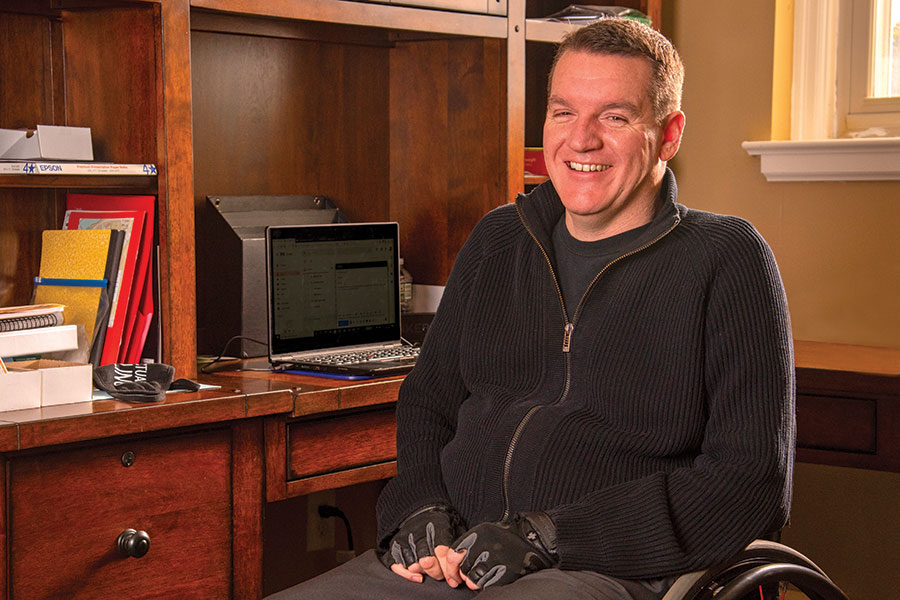THEIR LIFE'S WORK
Challenge the Status Quo
Chris Hilderbrant seeks to effect change through action, at work and in his personal life.
by Robin L. Flanigan

Chris Hilderbrant ’99 grew up in what he describes as a small, fairly closed-minded town. When a friend got him into the punk band Dead Kennedys, he discovered a different way of thinking about the world, and it set the stage for his advocacy work for disability rights.
“I was in a conversation once with someone who assumed that I was motivated by passion, but what motivates me more is inequity and injustice,” he says. “They make me angry.”
Hilderbrant knows a lot about inequity and injustice, from both personal and professional experience.
At 14 he became paralyzed after breaking his neck in a diving accident. He has decades of experience with trying to navigate buildings that lack ramps or elevators, and dealing with the absence of accessible curbs, crosswalks, and sidewalks.
That’s why, in addition to working as executive director of the Rochester Spinal Association, Hilderbrant owns a consulting firm specializing in helping businesses comply with the Americans with Disabilities Act.
In his final semester at Nazareth College, where he majored in sociology, Hilderbrant began working part time at the Center for Disability Rights, a nonprofit advocacy and service organization based in Rochester. He taught living skills—learned largely through his own experience—to people with developmental disabilities or traumatic brain injuries. He later served as director of advocacy, and then as the organization’s chief operating officer.
He has received national and state advocacy awards and in 2015 was named to the Rochester Business Journal’s Forty under 40 list of young leaders.
Hilderbrant’s definition of leadership is simple: “It’s helping people get where they want to go.”
Nazareth College helped him learn not only how to better understand and communicate ideas that challenge the status quo, but also “how to persuade others that those ideas are better instead of being locked in on ‘Well, this is how things have always been, so this is how they should stay,’” says Hilderbrant, who lives in Brighton with his wife and two teenagers.
He has traveled regularly to Washington, D.C., to educate legislators and lobby for disability supports. During final negotiations of the Affordable Care Act, for example, Hilderbrant’s efforts helped lead to the inclusion of the legislation’s Community First Choice Option, which amounted to $5 billion disbursed across the United States to support home care, independent living skills training, and other necessary services.
Inspired in part by Nazareth College sociology professor Harry Murray, who has said that civil disobedience is a moral responsibility, Hilderbrant has taken part in protests — once in handcuffs while chained to a White House fence.
Having grown up liking collision sports such as ice hockey and football, in 2013 Hilderbrant helped found the WNY Wreckers, a wheelchair rugby team.
“Wheelchair rugby is very different from conventional rugby,” he explains, “but what we have in common is this philosophy to go out and hit everything and don’t wear any protective equipment.”
The sport is a good release from the work Hilderbrant does every day, work that increasingly overlaps. Case in point: A discussion about pay for home care workers quickly turns into a discussion about urban poverty because a disproportionate number of those workers are women of color.
It’s easy to get overwhelmed by all the issues that need tackling.
Hilderbrant says the antidote is to start small: “Whatever you do, do something. The more of us that are doing something, the more change we can effect.”
Robin Flanigan is a writer in Rochester, N.Y.